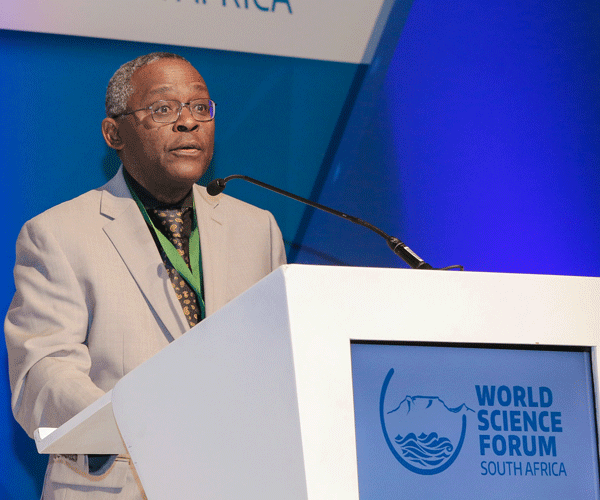
Science can play a key role in supporting social justice and “this is the time for action” urged TWAS Executive Director Romain Murenzi at the World Science Forum (WSF), a leading event on global science policy that took place from 6 to 9 December 2022 in Cape Town, South Africa.
The WSF is among the most significant science gatherings worldwide. Established by the Hungarian Academy of Sciences, in collaboration with the United Nations Educational, Scientific and Cultural Organization (UNESCO), the meeting assembles every two years to deliberate on the social and economic relevance, influence and responsibilities of science.
TWAS is among the WSF partner organisations, and TWAS Executive Director addressed the audience during the event’s opening ceremony on 6 December.
“Promoting science today is not only important: it is essential. This is true across the developing world and globally given the long-term threats posed by biodiversity loss and climate change,” Murenzi said.
“TWAS and the World Science Forum share a common vision: scientific discoveries and applications can help us to attain sustainable development and improve the quality of life for people all over the world,” he added.
“This is why we are one of the partner organizations behind this forum. And this is why we work together, as a network of like-minded organizations, to foster and maintain a dialogue between the scientific community, society, policy-makers, and industry.”
In his speech, TWAS Executive Director recalled that in 1963 TWAS founder Abdus Salam wrote that “with man’s recent mastery of science and technology there is no physical reason left for the existence of hunger and want for any part of the human race.” But while Salam’s vision is still true and relevant, Murenzi explained, hunger and want are still widespread in many parts of the world, and equality often remains an ideal to aspire to, rather than a tangible reality for all.
“We must facilitate a fairer, more equitable society, where science underpins sustainable development and accelerates the achievement of the United Nations’ Agenda 2030. We must build partnerships capable of stemming brain drain from the developing world. We must work hard and smart to transform our societies, to make sure that economic growth is inclusive, and to involve social and environmental dimensions. We must make science more inclusive, more democratic, transparent and more just by supporting the UNESCO Recommendation on Open Science” the TWAS executive director said, adding that “these are not only our collective responsibilities: these are also moral obligations.”
The WSF programme included 28 thematic sessions, which covered topics like climate change, science for human dignity, the Sustainable Development Goals, science for Africa, and science diplomacy. The InterAcademy Partnership (IAP) and the Organization for Women in Science for the Developing World (OWSD)—the two organizations whose secretariats are hosted by TWAS—also contributed to the programme. Most notably, IAP organized a thematic session on combatting predatory academic journals and conferences and OWSD’s Women in Science Film Festival presented 10 short films featuring the stories and contributions of women in science in Africa.
On 9 December 2022, the WSF adopted the ‘Declaration of the 10th World Science Forum on Science for Social Justice’.
Giovanni Ortolani

